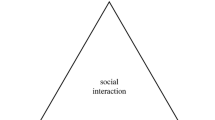Abstract
This paper considers factors that influenced long-term engagement in an online community. It draws on a case study of a 6 year online collaboration amongst a group of European teachers. The email interchange between these teachers was, with their agreement, saved and used as research data; intensive group interviews were also conducted, involving all the participants in the online group. Dynamic motivation models and Csikszentmihalyi’s concept of motivational flow were used to create a theoretical framework to analyse the email interchanges and group interview data so as to build an understanding of the teachers’ commitment to the online community. As a result of the analysis, the existing theoretical models were modified to produce a new combined model. This incorporates ideas grounded in the participants’ reasons for their sustained engagement in the collaboration. This combined model could provide a basis for planning future virtual interactions and for assessing their sustainability.







Similar content being viewed by others
References
Ames, C. (1992). Classrooms: Goals, structures, and student motivation. Journal of Educational Psychology, 84, 261–271.
Bandura, A. (1969). Principles of behaviour modification. New York: Holt, Rinehart & Winston.
Bandura, A. (1993). Perceived self-efficacy in cognitive development and functioning. Educational Psychologist, 28, 117–148.
Brewer, M. B., & Miller, N. (1996). Intergroup relations. Buckingham: Open University Press.
Covington, M. (1992). Making the grade: A self-worth perspective on motivation and school reform. Cambridge: Cambridge University Press.
Csikszentmihalyi, M. (1990). Flow. New York: Harper and Row.
Csikszentmihalyi, M. (1997a). Intrinsic motivation and effective teaching. In J. L. Bess (Ed.), Teaching well and liking it (pp. 72–89). Baltimore: John Hopkins University Press.
Csikszentmihalyi, M. (1997b). Finding flow. New York: Basic Books.
de Charms, R. (1968). Personal causation—The internal affective determinants of behaviour. New York: Academic.
de Charms, R. (1976). Enhancing motivation. New York: Irvington.
de Charms, R. (1984). Motivation enhancement in educational settings. In R. Ames & C. Ames (Eds.), Research in motivation in education vol I (pp. 275–3l0). New York: Academic.
Deci, E. L. (1980). The psychology of self-determination. Lexington MA: D. C. Heath.
Deci, E. L. & Ryan, R. M. (1985) Intrinsic motivation and self-determination in human behaviour. New York: Plenum.
Denzin, N. & Lincoln, Y. (Eds.). (1994). Handbook of qualitative research. Thousand Oaks CA: Sage.
Dornyei, Z. (2001). Teaching and researching motivation. Harlow: Pearson Education.
Dweck, C. S. (2000). Self-theories: Their role in motivation, personality, and development. Philadelphia, PA: Taylor and Francis Group.
Eccles, J., & Wigfield, A. (1985). Teacher expectancies and student motivation. In J. B. Dusek (Ed.), Teacher expectancies (pp. 185–226). Hillsdale, NJ: Erlbaum.
Eccles, J. & Wigfield, A. (1995). In the mind of the actor: the structure of adolescents’ achievement task values and expectancy related beliefs. Personality and Social Psychology Bulletin, p. 2l5–225.
Feurstein, R., Klein, P. S., & Tannenbaum, A. J. (1991). Mediated learning experience: Theoretical, psychological and learning implications. London: Freund.
Harter, S. (1981a). A model of mastery motivation in children: Individual differences and developmental change. In W. A. Collins (Ed.). Aspects of the development of competence: The Minnesota symposia on child psychology, Vol. 14 (pp. 2l5–255). Hillsdale, NJ: Erlbaum.
Harter, S. (1981b). A new self-report scale of intrinsic versus extrinsic orientation in the classroom: motivational and informational components. Developmental Psychology, 7, 300–312.
Hunt, J. (1961). Intelligence and experience. New York: Ronald Press.
Locke, E. A. & Latham, G. P. (1990). A theory of goal setting and task performance. Eaglewood Cliffs, NJ: Prentice Hall.
Maslow, A. H. (1954). Motivation and personality. New York: Harper.
Maslow, A. H. (1968). Towards a psychology of being. New York: Van Nostrand-Rheinhold.
Maslow, A. H. (1970). Motivation and personality (2nd edn.). New York: Harper & Row.
McKeachie, W. (2002). Teaching tips: Strategies, research and theory for college and university teachers (11th edn.). Boston, NY: Houghton Mifflin Company.
Pintrich, P. R. & Schunk, D. H. (1996). Motivation in education: Theory, research and applications. Eaglewood Cliffs, NJ: Prentice Hall.
Rotter J. B. (1954). Social learning and clinical Psychology. New York: Prentice Hall.
Slavin, R. E. (1983). Cooperative learning. New York: Longman.
Slavin, R. E. (1995). Cooperative learning. Boston: Allyn and Bacon.
Strauss, A. & Corbin, J. (1998). Basics of qualitative research techniques and procedures for developing grounded theory. Thousand Oaks, CA: Sage.
Vygotsky, L. S. (1978). Mind in society: The development of higher psychological processes. Cambridge MA: Harvard University Press.
Weiner, B. (1980). Human motivation. New York: Holt, Reinhardt and Wilson.
Weiner, B. (1992). Human motivation, metaphors, theories and research. California: Sage.
Williams, M. & Burden, R. (1997). Psychology for language teachers. Cambridge: Cambridge University Press.
Yin, R. (1994). Case study research: Design and methods (2nd edn.). Thousand Oaks, CA: Sage Publishing.
Author information
Authors and Affiliations
Corresponding author
Rights and permissions
About this article
Cite this article
Seddon, K., Skinner, N.C. & Postlethwaite, K.C. Creating a model to examine motivation for sustained engagement in online communities. Educ Inf Technol 13, 17–34 (2008). https://doi.org/10.1007/s10639-007-9048-2
Received:
Accepted:
Published:
Issue Date:
DOI: https://doi.org/10.1007/s10639-007-9048-2




